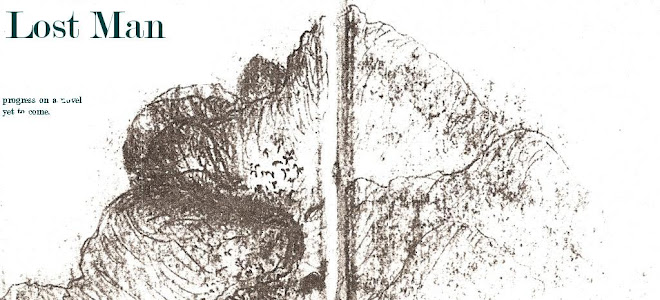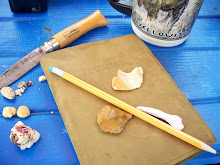From Lost Man:
She was such a quiet one, but she could carry a scold for walking in the house with dusty boots or leaving the living room a mess. Yet, she was the caring one, in her glances, warm loving eyes, and a soft rustle of hair is how she showed her love. I still don’t see how she could have stayed with my cold father. I didn’t know it either, not until Kurtz told me. It was the weirdest thing, because it’s the only time in all those years that he ever told me anything about my family.
The day of the trip, the Yellowstone I can’t remember, but I do remember going to him before we departed, making sure he’s alright, he was right sick. I could never forget his pale face and sunken eyes.
It was before dawn, we’d only greeted each other, and he said, “You wish to know how your parents met?”
I was taken by surprise, “Yes, but they’re dead.”
“Hmm,” and we sat there at his kitchen bar drinking coffee near his murky library.
“So, I’ll never know,” I said to just to break the silence.
“I believe you are old enough. Your wounds are healed and you are but scar tissue now, so not much could hurt you,” he was thinking aloud, but one look in his hollow eyes, and you could see a storm of contemplation.
“What are you talking about, Kurtz? We was talking about how my parents met. Are you thinking of those damn bison again? I haven’t checked the line, but assure you, everything is locked down tight.”
“Truman, no. My cattle are secure, and the bison are on the right side of the fence. I too was speaking of how your parents met. He told me once.”
Like a whistle it was always there, screaming in the background, I thought it was the fridge motor, but no, it was the
bomb falling.
“You know? How?” I was clench-jawed and dumbfounded; surely, I believed that knowledge to be dead with my parents.
“He told me,” was simply all he said.
“And what did he tell you?” I prodded. I know you have to dig deep with Kurtz, and I never tried to pry before because I respect the man -- his privacy, he saved my skin and my family’s property.
“He told me that he saved your mother’s life.”
I knew that. That is what my mother always said too, never him, though. I took it as a lie to cover up the fact that they met at the Bucking Horse Sale or something else equally slimy, but she never told me.
So, brokenly, I said, “I knew that. At least I’d heard it, not believed it.”
“Did he tell you how? Did she tell you how?”
“Never,” was all I could reply.
“Hmm,” was all he replied.
We sat for a moment in the shared, pregnant silence. He poured another cup of coffee, and then began, “I’ll the story as I remember: One winter night, many moons ago, a cow got loose from your father’s herd. It wandered loose, disillusioned in the blinding storm. Your father went after her on foot with a thick coat and a flashlight. He found her near here. The storm was worse by then, blizzarding to beat heck, as they would say around here. He knocked. I answered. We lodged the heifer in my barn for the night. He called home to your mother telling he was alright and that he’d be staying at my place for the respite. I took him to my study, and I cracked the red-wax seal on a bottle of Marker’s Mark. We drank the bottle and talked through the night to sound of the crackling fire and howling wind. He told me how he found your mother. I didn’t ask, he just began, and I tell it to you like he told it to me. He told:
‘I was an old man when I met Elizabeth – seventy-four. I’d already ranched my whole life into what most would call a retirement, but a rancher never retires. It was summer time. I’d like to travel to see rodeos around the counties, so it was that I was in Helena at the Last Chance Stampede. It was the end of July, hotter’n hell. I sweated through my hat and my feet swam in my boots. I was early, so I took a late-afternoon walk around the grounds, they have a lovely fairgrounds -- trees, a stream, and tranquil walking paths around the acres. I took off for the stream and trees to find shade and cool. I was deep back in the thicket, near the back and I was nearly on my way back. Came around a bend an found a braided chinaman with a machete readied to cut this girl’s throat. She was on her knees, hands tied behind her back, blindfolded. He had her hair knotted in one hand and the blade on her neck with the other. The deed and just begun, and a trickle of blood ran down her neck, staining the shoulder of her sun dress.
I yelled, “Hey! What’re you doing?! Get the hell away from her!”
He only glared at me, pissed that I had discovered his deed. Our eyes narrowed on each other, and I decided action was necessary, I ran at him. He dropped her, and with two hands, pointed his blade at me in some karate-jew-jit-su-shit move. I stopped before I got my head taken off. I reached behind me, like I was grabbing for my pistol, which I didn’t have. We stared at each other and breathed deep breathes. I remember how labored and intense those moments were. I offered, “What’re you doing? She’s just a girl.”
“Getaway,” he told me.
“No, not without an explanation, and not without her,” I told him, and he held the machete for a moment and lowered it.
“I sell her. Dis is what I do,” he said.
“You can’t sell a dead body,” I said.
“I sell dead girl. Pay more dan live girl.”
I was startled, “How’s that work, chink?”
"Minghun. Not for you know.”
“I take her, and I go to police, chink. What you think about that?”
“NO!” He yelled at me.
“Then how about you, me, and the girl go on over to the beer garden and talk this thing out.”
He held that blade at me for a long time, relenting, he put it down and nodded me on.
We drank beer, many beers.
She didn’t say a word, and drank nothing, because she was sixteen.
The old chink, told me that he gave up farming because of all the racist asshole in the valley. He took up bride selling instead. There’s a Chinese population in Helena, from the old railroad days. They keep to themselves, I never even knew they’re there. Thought they all went back to Chinaland or California. He told that in Chinese custom, the son must have a wife, even in death, or his soul will wander or some shit like that. The husband’s family finds him a wife, pays the family for her, and they marry him to her. His soul is represented by a doll, and she marries the doll, but the marriage is also his funeral. Dongyang, that was his name, Dongyang, said he got paid $1,600 for a live bride, $1,000 for a whore, or if he found a suitable recently dead bride, he could get $2,000 either way. A family with a dead son didn’t want a widow to take care of, so a dead girl is more desirable, making her more expensive. So, he made more money off dead girls. And because they’re so far from China, they’d take any dead girl, and because a dead girl was harder to find, he’d make his own dead girls.
I asked him, “Where’d you get her?” pointing to the blond haired girl.
“I buy her. Good used, cheap.”
“Where? How?” I asked him.
“I go to trailer-park. I knock on door. I ask for young girl. They think sex. I say, ‘no, buy.’ And I buy her for $1,200. Sell her for $2,000. Make $800,” he said so businesslike.
I couldn’t believe it. The absurdity, the cruelty of it, so I bought her for $2,000, alive. He insisted that I had to marry her, because of his values. “I sell wife, not whore. I no pimp,” he told me. So, I missed the Saturday rodeo talking with the chink and buying my bride. I stayed in town until Monday morning. Fresh at nine, we got married. I didn’t even know her name until that morning. She hadn’t even spoken to me until then. She only said, “Thank you. I do.” Dongyang and some clerk signed the witness sheet, I paid my $80 for the license, $2,000 to Dongyang, and I brought her back here. A year later I had my son, and that’s when you moved in, Kurtz.’
That’s how he told it to me, Truman. I kept it from you because it seemed so disruptive. I had no intention of taking this information with me to the grave. This seemed like as good of a time as any.”
I sat in silence, stunned at revelation.
“Truman, I hope I haven’t hurt you. I thought you’d want to hear the truth, at least what your father told me,” Kurtz was consoling. I’d never seen him act so, but I wasn’t ready for consoling.
I cried. I cried for my mother.




No comments:
Post a Comment